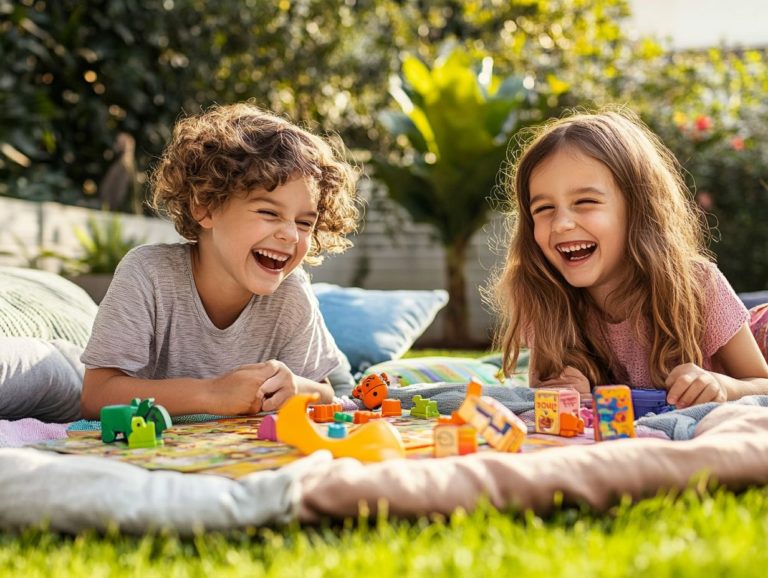What is the Role of Mindfulness in Attachment?
Attachment forms the cornerstone of human relationships, shaping the way you connect with others and, importantly, with yourself. It is particularly evident in the mother-infant relationship, which serves as the foundation for future interactions.
Understanding different attachment styles can help you see how you feel and connect with others. This article delves into the intriguing intersection of attachment and mindfulness, unveiling how embracing mindfulness practices can transform insecure attachments into more robust, healthier connections. Furthermore, recognizing these attachment dimensions highlights the importance of emotional regulation and overall well-being.
You will explore practical techniques designed to nurture mindfulness in your attachment style, identify the challenges that may surface along the way, and recognize when it’s crucial to seek professional assistance, such as behavior therapy or cognitive therapy.
Uncover the profound impact mindfulness can have on enhancing your relationships and bolstering your emotional well-being, especially through mindfulness-based stress reduction techniques.
Contents
- Essential Insights on Mindfulness and Attachment
- Understanding Attachment
- What is Attachment?
- What are the Different Types of Attachment?
- The Role of Mindfulness in Attachment
- How Does Mindfulness Affect Attachment?
- What are the Benefits of Mindfulness in Attachment?
- How Can Mindfulness Improve Attachment?
- Practicing Mindfulness in Attachment
- What are Some Mindfulness Techniques for Attachment?
- How Can Mindfulness Help with Insecure Attachment?
- Challenges and Limitations of Mindfulness in Attachment
- Seeking Professional Help for Attachment Issues
- Frequently Asked Questions
- What is the Role of Mindfulness in Attachment and Emotional Well-Being?
- How does Mindfulness Impact Attachment and Emotional Experience?
- Can Mindfulness Improve Attachment in Relationships and Enhance Mental Health?
- Is Mindfulness Helpful for Individuals with Insecure Attachment and Anxiety Disorders?
- Are There Any Specific Mindfulness Techniques that Can Improve Attachment and Reduce Anxiety?
- Can Mindfulness Be Used in Therapy to Address Attachment Issues and Improve Emotional Well-Being?
Essential Insights on Mindfulness and Attachment

- Mindfulness can positively impact attachment by promoting emotional regulation and improving communication and attunement between individuals.
- Practicing mindfulness can lead to a more secure attachment style by increasing self-awareness and reducing reactive behaviors.
- Mindfulness techniques, such as mindful breathing and body scans, can be helpful in improving attachment and creating a secure emotional bond with others.
Understanding Attachment
Understanding attachment is essential for grasping the complex dynamics of parent-child relationships and their profound impact on child development.
Attachment refers to the deep emotional bond that forms between a child and their primary caregiver, typically the mother. It serves as the cornerstone for emotional regulation and the development of relationships with others throughout life. The mother-infant relationship, in particular, is crucial for fostering a secure attachment and promoting overall mental health.
This bond plays a significant role in shaping a child’s emotional experiences, influencing their attachment styles and overall well-being. Numerous research studies highlight that secure attachment nurtures positive emotions and enhances self-awareness. Conversely, insecure attachment can lead to anxiety and emotional challenges during the transition to parenthood. Additionally, maternal depressive symptoms can further complicate the development of a healthy attachment bond.
What is Attachment?
Attachment is a psychological concept that encapsulates the emotional bond forged between you and your primary caregiver, often your mother. This bond plays a pivotal role in shaping your emotional regulation and relationships with others throughout your life. Attachment theory, developed by John Bowlby, emphasizes the importance of these early bonds in shaping future relational dynamics.
This connection is essential, as it influences not only your sense of safety and security but also your ability to navigate the complexities of social environments as you grow. The foundations of attachment are rooted in attachment theory, originally articulated by John Bowlby. This underscores the importance of a secure base provided by caregivers in fostering emotional and social development. This understanding can help you deal with attachment anxiety and avoidance.
For instance, children who enjoy a secure attachment are more inclined to explore their surroundings with confidence, secure in the knowledge that they can return to their caregiver for comfort. Conversely, those with insecure attachments may find themselves grappling with anxiety or avoidance in relationships. This highlights the critical importance of early bonding experiences for emotional health and development.
Start your journey towards better relationships today by practicing mindfulness!
What are the Different Types of Attachment?
There are three main types of attachment styles: secure, anxious, and avoidant. Each style reflects unique behaviors and emotional responses in your relationships.
Understanding these styles is vital for building stronger relationships. They shape how you connect with others and significantly impact your emotional well-being.
Secure attachment is founded on trust and safety, leading to healthy and empathetic relationships. However, if you have an anxious attachment style, you may feel clingy and fear abandonment, which can escalate your emotional responses during conflicts.
Conversely, those with avoidant attachment might distance themselves from emotional intimacy, suppressing their feelings to protect themselves. These styles typically develop in childhood and influence future relationship dynamics.
The Role of Mindfulness in Attachment
The role of mindfulness in attachment is becoming increasingly significant. It provides strategies that enhance emotional regulation and foster secure attachment within parent-child relationships.
Engaging in mindfulness practices, such as mindfulness meditation and loving-kindness meditation, allows you to cultivate present moment awareness and self-awareness. These two crucial elements are essential for effective parenting education and nurturing healthy emotional experiences.
By prioritizing well-being for both yourself and your children, mindfulness can serve as a powerful tool to alleviate attachment insecurity and improve satisfaction in your relationships. It is especially beneficial during the transition to parenthood.
How Does Mindfulness Affect Attachment?
Mindfulness significantly influences attachment by promoting emotional regulation and alleviating anxiety disorders. It also enhances your overall well-being, contributing to healthier parent-child relationships.
Practices like meditation and deep breathing help you develop a deeper awareness of your thoughts and feelings. This heightened awareness empowers you to respond to emotional triggers with intention rather than reacting impulsively.
Research conducted by Denny et al. (2015) shows that individuals who participate in mindfulness training experience marked improvements in emotional regulation, which leads to reduced anxiety and stress. This decrease in anxiety fosters a more secure environment for children, positively impacting attachment outcomes.
Mindfulness also enhances your capacity for empathy and compassion, further strengthening your relationships. Numerous studies support this notion, highlighting mindfulness’s role in improving interpersonal dynamics and promoting healthier attachment styles.
What are the Benefits of Mindfulness in Attachment?

The benefits of mindfulness in attachment are truly remarkable, offering you improved emotional well-being, enhanced stress reduction, and the cultivation of positive emotions that strengthen your parent-child relationships. These advantages extend to both mental health and relational therapy contexts.
By fostering present-moment awareness, mindfulness encourages you to tune into your emotions, leading to healthier emotional regulation. Research indicates that those who practice mindfulness often experience a significant reduction in anxiety and depressive symptoms, which can hinder the formation of secure attachments. A meta-analysis of various studies highlights the effectiveness of mindfulness-based stress reduction in improving emotional well-being.
Meta-analyses suggest that individuals who engage in mindful practices are better equipped to respond to stressors with calmness and clarity rather than reactivity. This ability not only enhances your personal well-being but also serves as a powerful model of positive coping strategies for your children, promoting a secure attachment bond.
Ultimately, integrating mindfulness into your daily interactions creates a supportive space where both you and your children can thrive emotionally. This approach is supported by numerous systematic reviews and research studies.
How Can Mindfulness Improve Attachment?
Mindfulness has the remarkable ability to enhance attachment by fostering self-regulation, encouraging positive emotional experiences, and equipping you with effective parenting strategies that nurture secure connections between you and your child. This holistic approach also addresses the challenges of maternal health and emotional difficulties.
By weaving mindfulness techniques such as deep breathing exercises, mindful listening, and body awareness into your daily routine, you can cultivate a more present and engaged demeanor. These approaches give you the power to manage your responses during challenging parenting moments, allowing you to maintain a greater sense of calm and emotional stability.
Engaging in reflective observation helps you identify your emotional triggers. This creates a safe environment for your child to express their feelings. This intentional practice not only strengthens the bond between you and your child but also exemplifies healthy emotional regulation, ultimately paving the way for more honest and supportive family interactions. Cognitive reappraisals enhance the effectiveness of mindfulness techniques in managing emotional stress.
Practicing Mindfulness in Attachment
Practicing mindfulness in attachment entails utilizing a range of mindfulness techniques designed to enhance your emotional regulation and cultivate secure connections in the relationships you share with your children. These techniques are also beneficial in addressing attachment anxiety and attachment avoidance in various interpersonal contexts.
What are Some Mindfulness Techniques for Attachment?
Some effective mindfulness techniques for enhancing attachment include mindfulness meditation and loving-kindness meditation, both designed to promote emotional well-being and foster secure connections. These practices are supported by various research studies and systematic reviews, confirming their efficacy in improving relationship satisfaction and emotional resilience.
These practices allow you to cultivate a deeper sense of compassion and presence essential ingredients for nurturing healthy relationships. Mindfulness meditation encourages you to become fully aware of your thoughts and feelings without judgment, giving you the self-awareness to respond to your children with greater empathy. On the other hand, loving-kindness meditation centers on generating feelings of love and kindness towards yourself and others, creating a caring environment that paves the way for better emotional regulation and positive emotions.
By implementing these techniques regularly, you can dramatically enrich your parent-child bond. You also equip yourself with invaluable tools to manage stress and anxiety, ultimately fostering a more harmonious home environment and contributing to healthy attachment.
Start your mindfulness journey today for a happier, healthier connection with your child!
How Can Mindfulness Help with Insecure Attachment?
Mindfulness can play a transformative role in addressing insecure attachment by enhancing your emotional regulation and alleviating anxiety disorders. This ultimately leads to greater relationship satisfaction, mental health, and emotional well-being.
By fostering awareness of your thoughts and feelings without judgment, you can learn to respond to emotional triggers with increased calmness and clarity. Research indicates that practices such as mindful breathing and meditation empower you to recognize and adjust your automatic reactions to perceived threats in relationships reactions often rooted in past experiences of insecurity.
For instance, a study published in the journal Attachment & Human Development revealed that mindfulness training significantly improved emotional regulation in participants with insecure attachment styles. These individuals reported feeling less anxious and more connected to their partners. This illustrates how such practices can lay the groundwork for healthier attachments, foster a sense of safety, and contribute to well-being in your interpersonal relationships.
Challenges and Limitations of Mindfulness in Attachment
Even with its numerous benefits, there are challenges and limitations when it comes to integrating mindfulness into attachment practices. This is especially true in the face of emotional difficulties, attachment anxiety, attachment avoidance, and chronic stress.
Challenges of Practicing Mindfulness in Attachment

Practicing mindfulness in the context of attachment can present challenges. Emotional difficulties may emerge during meditation or mindfulness exercises.
It’s important to recognize that regular practice is key to feeling less stressed. These emotional challenges might manifest as anxiety, sadness, or frustration, especially when confronting deeper issues related to your attachment style.
This process can feel overwhelming, potentially inducing reluctance to engage fully with your emotions. Embracing consistency and perseverance in your mindfulness practice is crucial for effective stress reduction and emotional regulation.
Regular engagement can gradually help desensitize these emotional responses, allowing you to build resilience. Establishing a routine fosters a sense of safety within yourself, ultimately enhancing your capacity to navigate your feelings and apply mindfulness effectively in your work with attachment and parenting strategies.
Limitations of Mindfulness in Attachment
The limitations of mindfulness in the realm of attachment can present various challenges. You may notice that the effectiveness of mindfulness techniques fluctuates across different contexts, influenced by factors like gaps in parenting education and chronic stress undermining your progress in child development and maternal health.
It can be difficult to implement mindfulness practices in high-stress environments filled with distractions, which can hinder your desired outcomes in relationships. The lack of comprehensive parenting education often leaves caregivers ill-equipped to grasp the nuances of nurturing emotional connections.
This knowledge gap results in inconsistent application of mindfulness principles, making it difficult to establish secure attachments. Chronic stress can further complicate matters, creating a mental environment where mindfulness feels overwhelming.
In such scenarios, engaging fully with the present moment may be challenging, diminishing the positive effects mindfulness could have on your relational dynamics.
Seeking Professional Help for Attachment Issues
Seeking professional assistance for attachment issues is an essential step for individuals and families grappling with profound emotional challenges. These challenges impact overall well-being, maternal depressive symptoms, and the quality of their relationships.
When is it Necessary to Seek Professional Help for Attachment Issues?
It is essential to seek professional help for attachment issues when you experience persistent emotional difficulties that significantly disrupt your daily functioning, maternal health, and relationships.
These emotional challenges may present themselves as anxiety in social situations or discomfort in close relationships. You might even find yourself excessively dependent on others, which can lead to misunderstandings and a sense of isolation.
Over time, you may feel caught in recurring patterns of conflict or avoidance that gradually erode trust with your partners, friends, and family members. These difficulties can also impact your job performance and career growth, compromising your overall well-being.
Spotting these signs early can transform your emotional journey! Understanding that therapeutic support can lead you toward healthier emotional connections, secure attachment, and enhanced life satisfaction is a vital step in your journey.
What are Some Therapeutic Approaches for Attachment Issues?
Several therapeutic approaches can effectively address attachment issues, such as cognitive therapy, relational therapy, and behavior therapy. Each of these methods is designed to enhance your emotional well-being and self-regulation.
Cognitive therapy focuses on reshaping negative thought patterns. It helps you cultivate a healthier perception of yourself and others through cognitive reappraisals.
Relational therapy focuses on the dynamics of your interpersonal relationships, providing a safe space for you to explore and understand your attachment styles.
Behavior therapy zeroes in on modifying unhelpful behaviors rooted in attachment insecurities. It encourages positive interactions and effective coping strategies that contribute to mental health.
By integrating these diverse techniques, you can gradually develop a more secure attachment style. This progress leads to enhanced emotional regulation and deeper connections in your relationships.
How Can Mindfulness be Incorporated into Therapy for Attachment Issues?
You can seamlessly integrate mindfulness into therapy for attachment issues by employing techniques that enhance emotional regulation. This approach encourages cognitive reappraisals of your attachment-related experiences.
This method invites you to engage with your emotional responses more consciously. You will identify and challenge automatic negative thoughts that often accompany your attachment styles.
By cultivating a non-judgmental attitude toward your feelings, you can develop healthier coping mechanisms. These mechanisms will effectively replace unhelpful behaviors and promote positive emotions.
Practical techniques like mindful breathing, body scans, or guided imagery can serve as valuable tools during your sessions. They help you anchor yourself in the present moment and increase present moment awareness.
As you enhance your emotional regulation, you pave the way for a more secure attachment style! This progress ultimately fosters improved interpersonal relationships and bolsters your resilience in the face of challenges.
Frequently Asked Questions

What is the Role of Mindfulness in Attachment and Emotional Well-Being?
Mindfulness plays a crucial role in attachment by promoting secure and healthy relationships. It does this through improved emotional regulation, allowing individuals to be fully present and attuned to their own needs and the needs of their partners.
How does Mindfulness Impact Attachment and Emotional Experience?
Mindfulness helps individuals regulate their emotions. This improvement enhances their ability to respond to their partner’s needs in a sensitive and compassionate manner, leading to more secure attachment and improved emotional experiences.
Can Mindfulness Improve Attachment in Relationships and Enhance Mental Health?
Yes! Research studies have shown that incorporating mindfulness practices into relationships can lead to an improvement in attachment styles, resulting in more satisfying and fulfilling relationships while enhancing mental health.
Is Mindfulness Helpful for Individuals with Insecure Attachment and Anxiety Disorders?
Yes, mindfulness can be especially beneficial for those with insecure attachment and anxiety disorders. It helps them become more aware of their attachment patterns and work towards developing a more secure attachment style.
Are There Any Specific Mindfulness Techniques that Can Improve Attachment and Reduce Anxiety?
Some mindfulness techniques that have been found to be effective in improving attachment and reducing anxiety include mindful breathing exercises, loving-kindness meditation, and mindful communication.
Can Mindfulness Be Used in Therapy to Address Attachment Issues and Improve Emotional Well-Being?
Mindfulness-based methods can be used in therapy to address attachment issues. These include mindfulness meditation, which is a technique where you focus on your breath and stay present in the moment, and mindful practices.
These practices help individuals become more aware of their attachment patterns and improve emotional regulation. They also enhance self-awareness, ultimately aiding in the development of more secure attachment styles.
Mindfulness training and mindfulness-based stress reduction (MBSR) are proving effective in managing anxiety disorders, chronic stress, and depression. These conditions are often linked to attachment insecurities, making it crucial to address them promptly.






